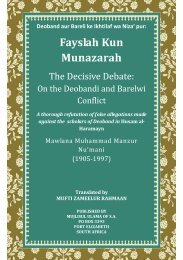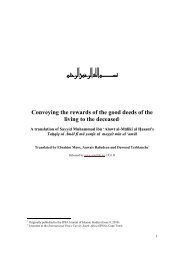al_etidaal_gn
al_etidaal_gn
al_etidaal_gn
Create successful ePaper yourself
Turn your PDF publications into a flip-book with our unique Google optimized e-Paper software.
“0 Allah, whosoever follows me, is of me and whosoever disobeyes me, verily You<br />
are Forgiving, Merciful.”<br />
And 0 Abu Bakr (Radi<strong>al</strong>lahu anhu) your example is like Nabi ‘Esa (Alayhis S<strong>al</strong>aam),<br />
who said:<br />
“0 Lord, if You punish them, (You have the right) for they are Your servants, and if<br />
You forgive them (You have the right) for You are the Mighty, the Wise.”<br />
And 0 Umar (Radi<strong>al</strong>lahu anhu) your example is like that of Nabi Nooh (Alayhis<br />
S<strong>al</strong>aam) who said:<br />
“0 Lord leave not one of the disbelievers in the land for if you leave them, they will<br />
mislead others... (71.26-27) And your example is like that of Nabi Musa (Alayhis<br />
S<strong>al</strong>aam) who said:<br />
“0 Lord, destroy their we<strong>al</strong>th and harden their hearts so that they believe not,<br />
(increasing in disbelief), until they see the painful chastisement. “(X 89) (Tirmidhi)<br />
Similarly there were other differences between these two Shaikhs. They disagreed<br />
regarding the waging of war against those who refused to pay Zakaat. Thereafter they<br />
disagreed regarding the taking of the we<strong>al</strong>th of these people as war booty and about<br />
enslaving their wives and children. They disagreed on despatching Usaamah’s<br />
(Radi<strong>al</strong>lahu anhu) army and about the dismiss<strong>al</strong> of Kh<strong>al</strong>id bin W<strong>al</strong>eed (Radi<strong>al</strong>lahu<br />
anhu) from the leadership of the army. In the end in spite of the insistance of Umar<br />
(Radi<strong>al</strong>lahu anhu), Sayyidina Abu Bakr (Radi<strong>al</strong>lahu anhu) refused to remove Kh<strong>al</strong>id<br />
(Radi<strong>al</strong>lahu anhu). The moment Umar (Radi<strong>al</strong>lahu anhu) became C<strong>al</strong>ipha, he had<br />
Kh<strong>al</strong>id (Radi<strong>al</strong>lahu anhu) replaced and sacked him. There was differences regarding<br />
the compilation of the Quran, the legacy due to a grandfather and regarding the thief<br />
convicted of theft for the third time. Abu Bakr (Radi<strong>al</strong>lahu anhu) ordered the left<br />
hand to be cut off, whereas Umar (Radi<strong>al</strong>lahu anhu) during his C<strong>al</strong>iphate refused to<br />
do so. According to Abu Baicr (Radi<strong>al</strong>lahu anhu) the s<strong>al</strong>e of a slave-woman who had<br />
borne a child to her master was permissible. Umar (Radi<strong>al</strong>lahu anhu) considered it not<br />
permissible. There were many points of Islamic Law and policy where these two<br />
eminent sons of Islam disagreed. If we want to note them <strong>al</strong>l, we require much more<br />
space than this letter.<br />
Differences between the Sahabah (Radi<strong>al</strong>lahu anlium)<br />
Al- Eti’da<strong>al</strong> Fi Maraatibur- Rija<strong>al</strong> 154




